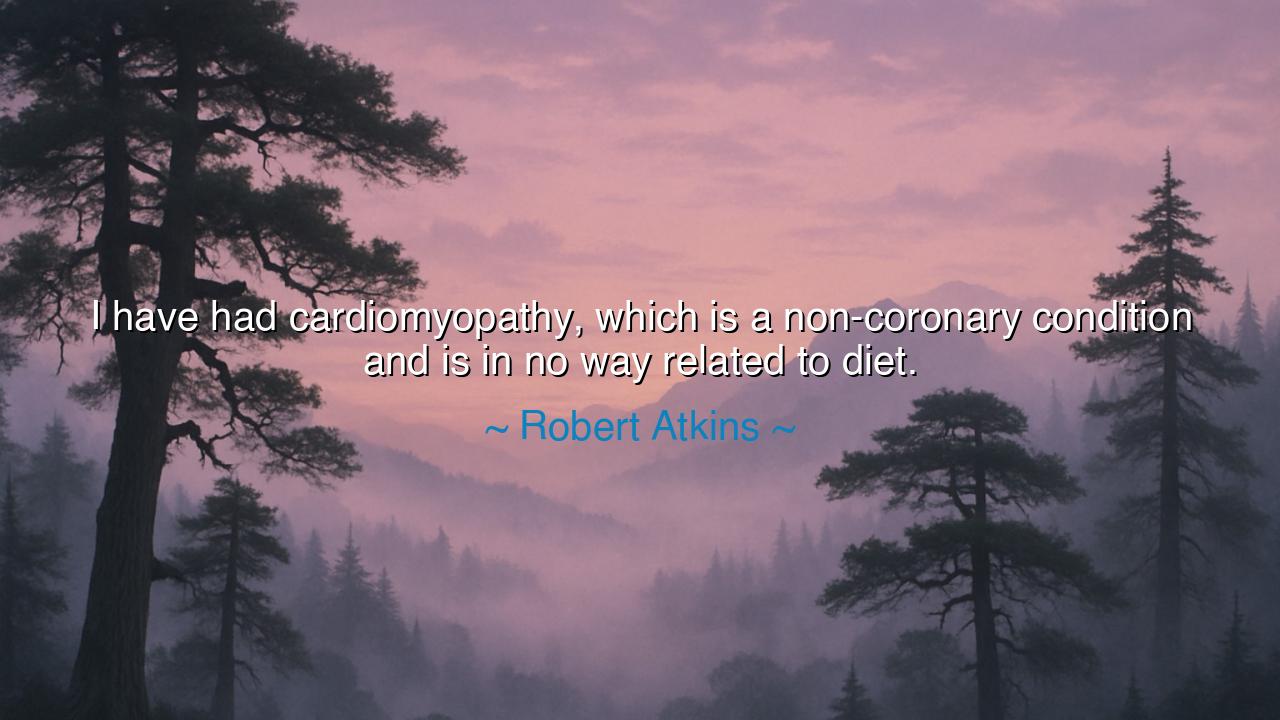
I have had cardiomyopathy, which is a non-coronary condition and
I have had cardiomyopathy, which is a non-coronary condition and is in no way related to diet.






O children of the earth, hear now the words of wisdom spoken by one who knew both the heights of success and the depths of personal struggle. Robert Atkins, a man whose name has become synonymous with the very diets he championed, speaks here of a truth that is both deeply personal and universally profound: "I have had cardiomyopathy, which is a non-coronary condition and is in no way related to diet." In these simple words, Atkins imparts a deep lesson about the nature of the body, health, and the limitations of our understanding. For while diet and lifestyle play a crucial role in our well-being, they do not account for every affliction we may face, for there are forces within the body that are beyond our control.
Cardiomyopathy, as Atkins describes it, is a condition that affects the heart muscle, weakening it and impairing its ability to pump blood. It is not a disease that can be blamed on lifestyle or nutrition alone. Atkins’ declaration is a reminder of the complexity of the human body, a reminder that not all ailments can be traced back to one source. The ancients, with all their wisdom, knew that life is not a simple equation—health and suffering are often intertwined with forces that transcend human understanding. Just as the mighty rivers of the earth cannot be entirely tamed, so too can the body not always be understood or controlled.
In ancient Greece, the philosopher Heraclitus spoke of the eternal flux of life, the constant change that governs the world. "You cannot step into the same river twice," he said, for the waters are always moving, always shifting. So too is the body a river, constantly changing, subject to forces both known and unknown. Atkins’ words echo this truth—that our bodies are not machines that can be perfectly calibrated; they are complex systems, ever-shifting and sometimes affected by forces beyond our understanding.
Consider the great warrior Achilles, whose body was nearly invulnerable save for the one weakness, his heel. Even the mightiest among us, though strong and resilient, can suffer from conditions beyond their control. Achilles’ fate was not sealed by his diet or his lifestyle, but by the hidden flaw in his heel—a flaw that even the gods could not prevent. In the same way, Robert Atkins’ battle with cardiomyopathy was not due to any weakness in his approach to health, but a random, uncontrollable affliction that he could not have anticipated or avoided.
The lesson here, O children of the earth, is not one of despair, but of acceptance and understanding. While it is true that we must take responsibility for our health, nurturing our bodies through wise choices in diet and exercise, we must also recognize the limits of our control. Not everything in life is within our power to change, and not all suffering can be attributed to our actions or lack thereof. Atkins’ words remind us to approach our health with both care and humility, understanding that there are forces in the body, and in life, that remain mysterious.
So, let us not fall into the trap of believing that all suffering is self-inflicted, nor that all health is a result of our own efforts. The body is a complex vessel, one that requires our care, yes, but also our respect for the mysteries it contains. In times of illness or struggle, we must approach our bodies not with shame or blame, but with compassion and understanding. And while we can work to nourish and strengthen our bodies, we must also acknowledge the unknown forces that shape our lives, and in doing so, find peace with what we cannot control.
Therefore, O seekers of truth, let this be the wisdom you carry with you: take care of your body with intention, nourish it with respect, and tend to it with diligence. But remember, too, that the forces of fate and nature are beyond our understanding. Do not despair in the face of illness or suffering, but accept the complexity of life with grace. In this way, you will find both strength and peace, knowing that you have done all that is within your power, and that some things are beyond even the mightiest of human wills.






AAdministratorAdministrator
Welcome, honored guests. Please leave a comment, we will respond soon